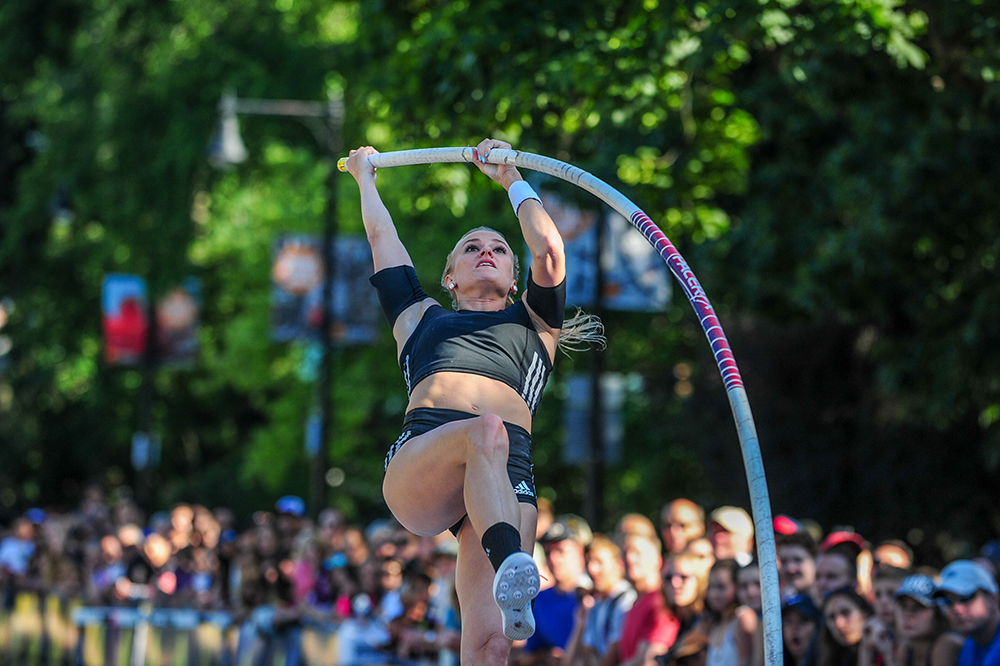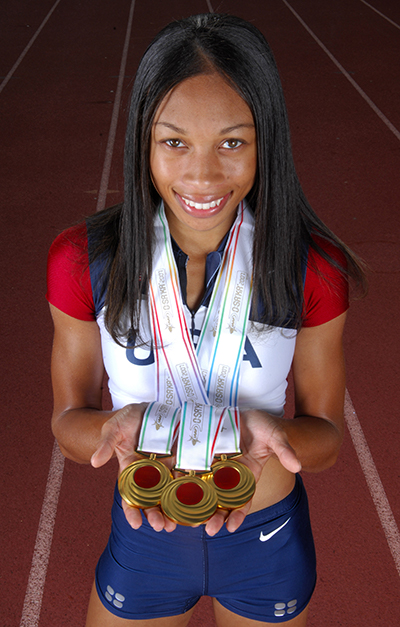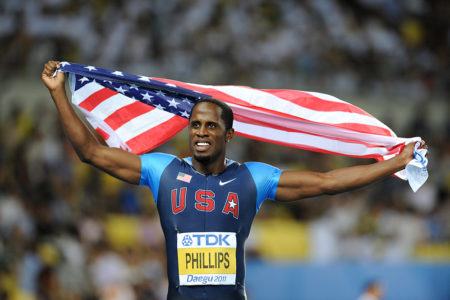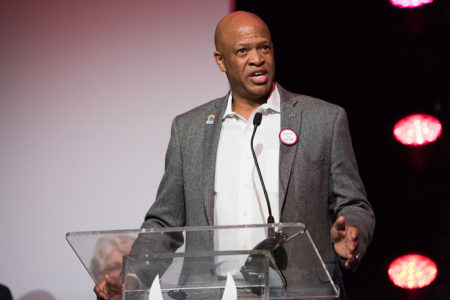Here’s this month’s collection of generally off-track activities that have gone a long way towards shaping the way the sport is headed:

Stadium? Who Needs A Stadium?
Coming soon to a street near you, expect to see more track & field action on the macadam. As part of the IAAF’s push to bring more innovation to the sport, Monaco is embracing the notion of more outside-the-stadium competition, telling Gene Cherry of Reuters, “There is currently a working group looking at the possibility of creating a street athletics circuit.”
In addition to Boston’s adidas Boost meet organized by agent Mark Wetmore, 2019 will see the debut of an American Track League street circuit, with events planned for Atlanta (July 02–03), Greenville (July 06), Charlotte (July 13) and Omaha (August 01). ATL founder Paul Doyle tells Cherry, “Street meets are great for promoting the sport and featuring events that get lost in the stadium.”
Says Wetmore, whose Boston street event will be June 16, “It’s the best way to reach people who have never been to a track meet, especially kids. When you see these athletes up close and see how fast they move, it really is something.”
U.S. To Tackle Europe In A Dual Meet
In the lead-in to next fall’s World Championships, which start on September 28, the U.S. will take on Europe in a head-to-head match set for Minsk, Belarus, on September 9–10. “We are proud to announce there will be a match for the first time since the 1960s,” said European Athletics President Svein Arne Hansen. “We are going to include every track discipline up to the 3000m for men and women (excluding 4 x 400m). We will have all the throws, jumps and a 4 x 100m relay, and there will be a mixed medley relay.”
Said USATF CEO Max Siegel, “We welcome the opportunity for our athletes to compete in a team match leading up to the 2019 World Championships.”
Prize money in Minsk will be awarded to the top 8 in each individual event, with winners getting 7000€ (c$8000). Relay winners will win 6000€ (c$6900). It’s not known at this time how either of the teams will be chosen, but they may be shy on high-end athletes who have competed in the DL Final in Brussels just 3 days earlier.
Budapest To Host ’23 World Championships
The IAAF has chosen Hungary’s capital city of Budapest as the site for World Championships XIX. There were no other candidates, as the IAAF now chooses its hosts based on a new consultation process. The meet will be staged August 12–20. A new 40,000-seat stadium will be constructed on the banks of the Danube, but 25,000 seats of that capacity are temporary and will be removed after the meet is over. It was certainly no shock that the meet ended up in a European city. With ’19 in Doha and ’21 in Eugene, this was the first time the meet had ever been held outside Europe twice in a row.
In announcing the decision, IAAF head Seb Coe said the international governing body was “delighted” to award the meet to “a country of extraordinary athletic tradition and great experience in organizing world-class sports events.” Budapest previously hosted the ’89 and ’04 World Indoor Championships. The ’23 bid was launched in ’17 after Budapest’s hopes for formulating a ’24 Olympic bid evaporated.
Jamaica Possible Host For ’21 World Relays?
After 3 World Relays hostings by the Bahamas (’14, ’15 & ’17), followed by next year’s staging in Yokohama, Japan, could the big baton meet be headed back to the greater Caribbean in ’21?
“The IAAF had written to us and given us really a first offer on 2021 because they have not decided on the full bidding process, but I suspect—based on the tone of the letter that I received and I replied to—that it has not yet been put to member federations,” Jamaican federation head Warren Blake told the Jamaica Gleaner at the end of November. “If Jamaica wants it, Jamaica will have first choice.”
With work to upgrade the National Stadium set to begin in January, Blake has signaled his nation’s interest in the meet: “I have replied to them to say that yes, the federation is interested.” One of the key requirements is a financial guarantee amounting to close to $7 million.
Concluded Blake, “I’m fairly certain the event will be ours because the IAAF wants to have those relays in the Caribbean because they see it as a more Calypso-type event—brings more excitement—and we have very strong relays in the Caribbean as well, so it will have a home crowd.”
The IAAF’s 2019 World Indoor Tour
Details have been announced for the fourth edition of the IAAF’s World Indoor Tour. The series will include 6 meets: Boston, Massachusetts (January 26), Karlsruhe, Germany (February 02), Toruń, Poland (February 06), Madrid, Spain (February 08), Birmingham, England (February 16) & Düsseldorf, Germany (February 20). Five of the six meets are holdovers from last year, the British switch being Birmingham back in and Glasgow out.
There will be 5 Tour events for men (400 & 1500 in all 5 meets, 60H in all meets but Karlsruhe, HJ in all but Boston & Madrid and LJ in all but Boston & Düsseldorf) and 6 for women (60 in all 5 meets, 800 in all but Karlsruhe & Madrid, 3000 in Karlsruhe, Madrid & Birmingham, 5000 in Boston, PV in all but Toruń, TJ in Karlsruhe, Madrid & Düsseldorf and SP in Boston, Toruń & Düsseldorf).
The total prize purse of $570,350 will find the winner of each event at each meet receiving $3000. The winner of the overall title in each event—calculated off the athlete’s 3 best results—will receive $20,000. And as a bonus, each of the overall winners will be eligible for Wild Card status for the ’20 World Indoor, to be staged in Nanjing.
Who Will Pay For Eugene’s World Championships?
Jeff Manning of oregonlive.com has raised major questions about the financing of the ’21 World Championships in Eugene after the revelation that the University of Oregon Foundation—which earlier had publicly declared itself willing to cover any deficits—says it is off the hook.
In an early-December report, Manning wrote that Paul Weinhold, President and CEO of the Foundation, says that his organization was not asked to sign the IAAF’s event contract and therefore is not required to follow through on its commitment. This comes after Governor Kate Brown committed a total of $25 million in tax money to the event. Her chief of staff, Nik Blosser, says that the financial guarantee from the Foundation was instrumental in the state deciding to support the event.
Also reportedly displeased is the IAAF, which insists “The Foundation guarantee is part of the event contract.” The IAAF’s Jackie Brock-Doyle produced a September ’14 letter from Weinhold addressed to then-IAAF President Lamine Diack in which Weinhold stated, “Please accept this letter as our written guarantee that the University of Oregon Foundation will unconditionally cover any potential shortfall deficit of the future organizing committee budget of the IAAF World Championships in Eugene in 2019.” It was written before the ’19 edition was awarded to Doha and Eugene accepted ’21.
Now the state, through Blosser, says that USATF will be assuming the financial guarantee. That has not been confirmed; so far USATF has publicly committed $6 million.
Eugene organizers are saying the state government will have to kick in an additional $15 million to make the event fly, bringing the taxpayer total to $40 million, a figure that will likely create more public opposition to the event.
The financing mess is not directly connected to Eugene’s other major headache, the ongoing Federal investigation into the winning bid. It has been revealed that USATF President Vin Lananna—now on forced leave from that position—was subpoenaed and questioned by the FBI in 2017. Lananna has since resigned his positions with Oregon ’21 and Track Town to avoid the appearance of conflict of interest with his USATF post.
The newly-hired CEO of Oregon ’21, Niels de Vos, insists that USATF will come through with the financial guarantee. Until then, count on lawyers on all sides to generate significant billable hours.
Tara Davis In Limbo After Deciding To Transfer
One of this year’s most brilliant frosh, Tara Davis—a hurdler/jumper scored at the NCAA both indoors and out—has left Georgia and has gone public with her efforts to get a release from the Bulldogs.
“I’m in the process of looking for a new school to attend,” Davis said in a video she tweeted. “Last week while I was visiting the University of Texas, a tweet went out saying that I had signed and committed to the University of Texas, which is completely false. This hurt my chances in talking to other schools I’m interested in… Georgia has blocked me from competing in the 2018-19 season. I am hoping to be able to get released.”
I am currently not allowed to compete this track season. I need your support as I appeal University of Georgia and coach Petros’ decision not to release me to run for any other NCAA university this 2018-2019 season. pic.twitter.com/LSmN74wrqh
— Tara Davis (@tar___ruh) December 19, 2018
Davis initially announced her departure on Instagram on December 7. The tweet she referred to was sent out by Georgia coach Petros Kyprianou on December 13. While not specifically saying that Davis had signed at Texas, it is implied in the last sentence: “Best of luck at the University of Texas!”
Details are unclear as to how the NCAA’s new transfer rules—which took effect October 15 and in theory were supposed to offer athletes more flexibility to transfer at will—affect this case. Georgia is remaining mum on the subject.
The IAAF Gets A New CEO
Former world-class high hurdler Jon Ridgeon has a new role in the sport 31 years after winning silver at the ’87 World Championships. The IAAF Council has approved the Briton’s appointment as the organization’s new CEO. The 2-time Olympian—and NCAA scorer for SMU as a frosh in ’86—has been active in a number of sports-related businesses and is noted for helping transform British Athletics in the late ‘90s into a financial success. Ridgeon, 51, is also cited as one of the architects of the IAAF’s Diamond League.
“Having spent my life in sport, this is a dream job for me and I am absolutely thrilled,” said Ridgeon, who starts in March. “Athletics is my passion and I have devoted the vast majority of the past 20 years to creating successful commercial partnerships, developing new events that drive participation at both elite and grassroots levels, as well as leading organizations that deliver significant projects across the globe. “I am delighted to be joining world athletics at this exciting time and look forward to working with Seb [Coe], a strong team and all our member federations across the globe.”
Said Coe, “I, and a number of the IAAF Council members, have known Jon for many years and admired his passion, energy and innovation in sport, particularly athletics. His experience in putting together great teams, running large successful companies, delivering top-class events and bringing strong commercial partners into sport makes him the right choice for this role.”
Allyson Felix’s Truncated Season Explained

Mega-medaled sprinter Allyson Felix has revealed that she gave birth to a daughter, Camryn, on November 28, with husband Kenneth Ferguson, himself a former world-class 400 hurdler.
“I was 8 weeks pregnant at the race in Poland and 9 weeks at the race in France,” she said in telling ESPN W about the pair of June 400s that ended her season. “I thought I could keep the news to myself and my husband, Kenneth, for a little longer, that I’d still be winning races as long as I trained hard.
“I mean, Serena Williams won the Australian Open early in her pregnancy. If I had enough willpower, I should be able to do the same. Then I could shut it down midway through the season—which is what I’d planned to do in the off-year when there’s no Olympics or outdoor world championships regardless—and be back by early 2019 without anyone noticing I was gone.” Now she says, “And, hold up: why was I trying to do all this without anyone noticing I was gone?”
Now focused on parenthood and dealing with a premature birth as well preparing a bid to make her fifth Olympic team, Felix said, “If I come back and I’m just not the same, if I can’t make a fifth Olympic team, I’m gonna know that I fought, that I was determined, and that I gave it my absolute all.” She didn’t address any potential plans for the ’19 campaign.
The Russian Ban Is Extended
There will probably be no Russian team, as such, at the European Indoor Champs in February as the IAAF extended the nation’s ban for the ninth time at its December Council meeting. Removing this latest extension is contingent on whether the samples and data from the Moscow Laboratory are made available before the December 31 WADA deadline. In addition, the IAAF is waiting for Russia to pay off its $2.76 million legal debt, something they have agreed to in principle.
A 5-member WADA team arrived in Moscow in mid-December to collect data and samples. The data extraction was expected to take 3 days. Even with the Russians apparently meeting the deadline, the IAAF will need several months to review the data before agreeing to reinstatement. There are concerns that the data may have been tampered with.
The IAAF also announced new guidelines for Russian athletes to participate with neutral status in international events. In addition to streamlining the process for athletes who have been approved in the past, it also requires that each athlete submit a letter from the Russian Federation verifying their eligibility. Athletes must have been in a WADA testing pool for 12 months prior to the competition in question. For U20 (Junior) athletes, that period is 6 months.
The IAAF has also reserved the right to postpone the approval of any neutral athletes until it has had time for an authorized lab to recheck their samples that come from the Moscow lab.
USATF’s 2019 Live-Event Coverage
Once again, USATF will be working with the NBC Sports Group to televise/stream track coverage. Planned is more than 50 hours of live-event coverage during the ’19 season.
The breakdown:
January 26—Sander Invitational; USATF.tv
January 26—New Balance Boston GP; NBCSN
February 09—Millrose Games; NBC
February 23-24—USATF Indoor; NBCSN
April 26-27—Penn Relays; NBCSN
April 27—Drake Relays; NBCSN
May 16—USATF Distance Classic; NBC Sports Gold
June 16—adidas Boost Boston; NBC
June 30—Prefontaine Classic; NBC
July 04—Peachtree 10K; NBCSN
July 25-28—USATF Championships; NBC, NBCSN
September 08—5th Ave. Mile; NBC
All televised coverage will also be available through the NBC Sports Gold streaming service.
American Records You Didn’t Know About
USATF has moved to close a gap in the records department that for long went basically unnoticed. Specifically, the rules said that to set an American Record you needed to be a U.S. citizen. Nothing was said about people with dual-citizen status who weren’t eligible to represent the U.S. internationally, so they were eligible all along. USATF has now moved to close that loophole, but the new rule won’t be applied retroactively, so any marks made in 2018 or earlier are eligible.
That means that Mondo Duplantis not only set a rash of American Junior Records in the vault in ’17 and ’18, he also claimed the American Record, period. His 19-10¼ (6.05) at the European Championships this year—made while representing Sweden—replaces Brad Walker’s ’08 mark of 19-9¾ (6.04).
Another Swede who was born in the U.S., Susanna Kallur, now claims the indoor 60H AR at 7.68 (which is also the WR), set in ’08. That means that the accepted AR of 7.72 set by Lolo Jones was never really the AR. And a 7.72 by Keni Harrison—and 7.70s by Harrison and Sharika Nelvis—earlier this year won’t get any recognition either.
There’s one other AR change, with Bernard Lagat swiping the 1500 best from… Bernard Lagat! Lagat held the AR with his 3:29.30 from ’05, but it turns out that while representing Kenya in ’04 he already had his U.S. citizenship so his 3:27.40 from that year becomes the AR.
Radical Change Coming For The Multis?
The “Gundersen Method” may be coming to a multi-event near you in the coming years. The IAAF says that it wants to try it out in the decathlon and heptathlon at the ’20 World Junior (U20) Championships. The protocol—which originated in the world of Nordic skiing and is also used in Modern Pentathlon—staggers the starts of contestants in the final event so that the finish order of that race is also the finish order of the event proper.
The problem is in the execution. Under Gundersen, the points leader after 9 events in a decathlon starts first, and may well run alone the entire way, ideally crossing the finish before anyone else has a chance to catch up to him. (The other contestants start at intervals behind him, based on how far behind their 9-event point totals are.)
The challenges of such a radical retooling are evident. In fact, the IAAF Technical Committee rejected the idea several years ago as unfeasible. Says Frank Zarnowski, one of the world’s leading experts on the multis, “Suppose the leader has a VERY large point lead after 9… he runs alone for several laps… not very exciting. Also, the 1500 does not become a competitive event… not a contest, but just a time trial. They did it because they wanted to inject some excitement into [combined events] but this only works if the point totals are very, very close after 6 or 9 events.”
We’ll dig into this concept in depth in the January edition. □



